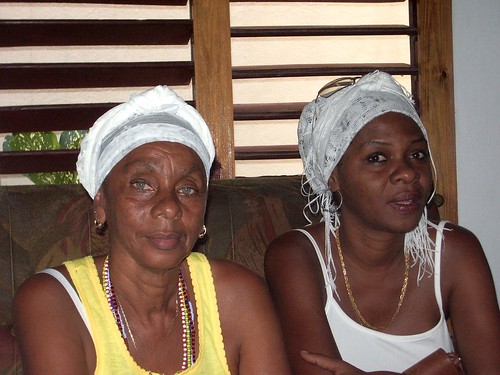
My final project is about the religion of Santeria and the empowering effects it has had for the women who practice it. In order to explain these effects I decided to interview four priestesses ordained in this religion. These four priestesses have years that vary between three to thirty-six years. It was video recorded in an interview format a ranging from questions of their experiences as Iyawos, new initiates, to being madrinas, godmothers, to other initiates and other godchildren. This one of the many rare moments many of initiates in Santeria ever speak of their experiences before, during and after ritual and ceremony. I also discuss if there is problems with the compromising integrity and equality. In the process, I came to realize there have not been problems of that sort at all. This is due to the relationship between the godparent and godchild within an ILE, a house of worship or equivalent to a temple. Furthermore, the varying differences of respect between the senior elder, the Iyawo, and the godchild. My video is only a hard copy, and will not be viewed as a link.
Works Cited
Abimbola, Wande. Ifa Will Mend Our Broken World: Thoughts on Yoruba Religion and Culture in Africa and the Diaspora. Roxbury: Aim Books, 1997.
Brandon, George. Santeria from Africa to the New World: The Dead Sell Memories. Bloomington : Indiana University Press, 1993.
Brown, David H. Santeria Enthroned: Art, Ritual, and Innovation In An Afro-Cuban Religion. Chicago: The University of Chicago Press, 2003.
Cuando los Espiritus Bailan Mambo. Dir. Bobby Shepard. Prods. Bobby Shepard and Marta Moreno Vega. 2002.
Drewal, Thompson Margaret. Yoruba Ritual: Performers, Play, Agency. Bloomington : Indiana University Press, 1992.
Elebuibon, Chief Priest Ifayemi. Apetebii: The Wife of Orunmila. Brooklyn: Athelia/Henrietta Press, INC., 1994.
Johnson, Paul Christopher. Secrets, Gossip, And Gods. New York: Oxford University Press, Inc., 2002.
Murphy, Joseph M. and Mei-Mei Sanford. Osun across the Waters: A Yoruba Godess in Africa and the Americas. Bloomington: Indiana University Press, 2001.
Omari-Tunkara, Mikelle Smith. Manupulating The Sacred. Detroit: Wayne State University Press, 2005.
Vega, Marta Moreno. The Altar of My Soul: The Living Traditions of Santeria. New York: The Ballantine Publishing Group, 2000.
Barbara OshunTolu
Maria Alabi
Elizabeth OshunAladeKoide
Music Credits
"Yemaya Cantos"
Performed By: Emilio Barreto and Orlando "Puntilla" Rios
"Ochun Rezos"
Performed By: Emilio Barreto and Orlando "Puntilla" Rios

Hi BT, where might I view your finished product? I am very interested in your topic.
ReplyDelete